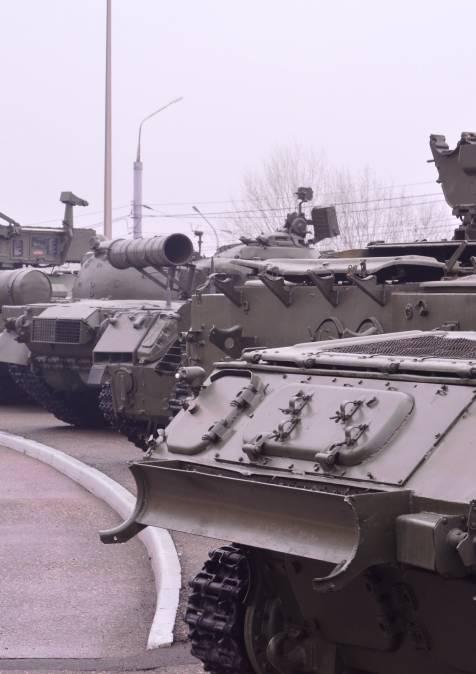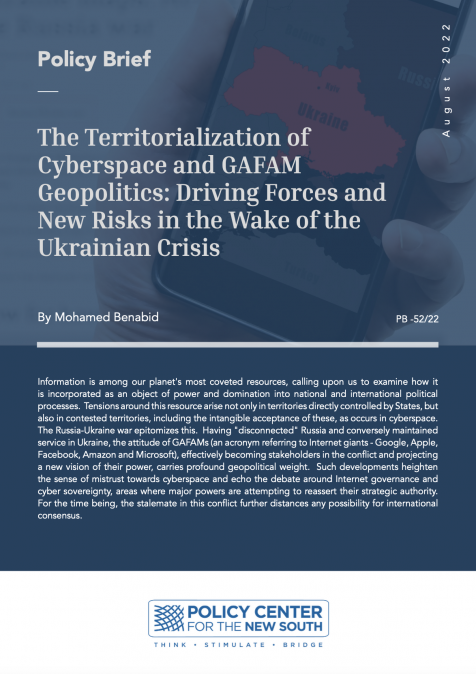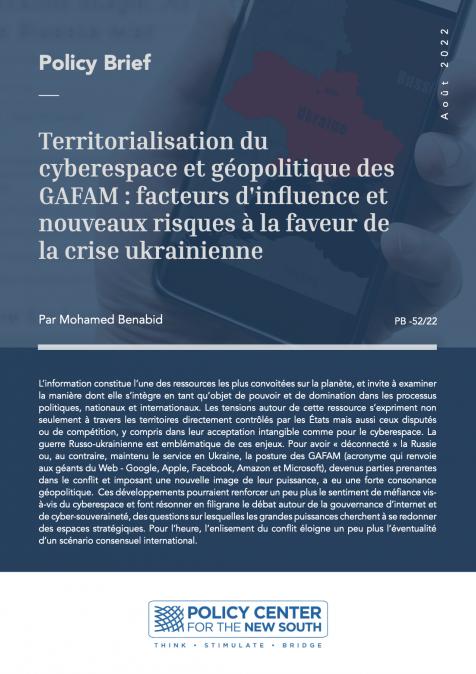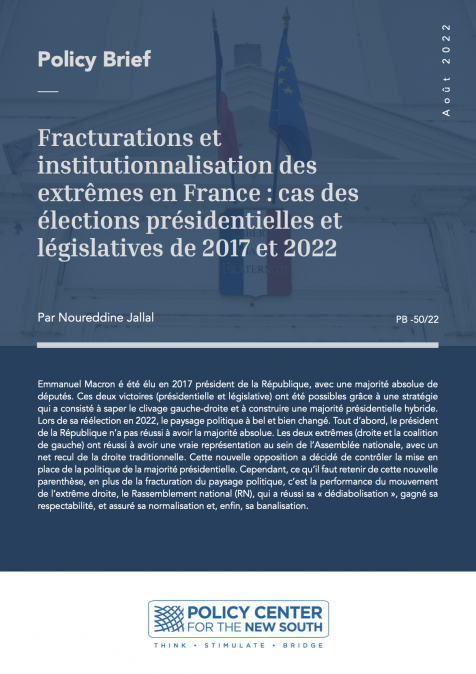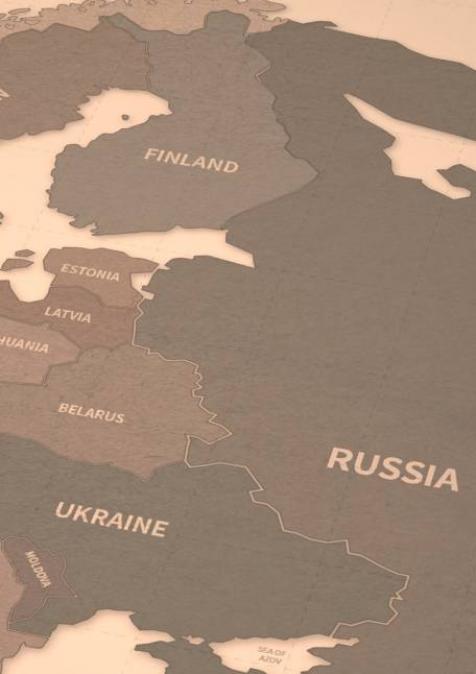Publications /
Opinion
"German chancellor Angela Merkel may be forced to cede her power earlier than expected after episodes of violent and controllable shaking in public has led party officials to fear for her health." Announcements we have been reading in the press these past days. Below is an international press review of events leading to these times of uncertainty, by Helmut Sorge, former Foreign editor, and Middle East expert for Germany's leading newsmagazine "Der Spiegel", and columnist at the Policy Center for the New South.
They know her as « Mutti ». Angela Merkel has no children of her own, but is the mother of Germany, at least for those who voted for her the last 14 years. She is the first ever woman chancellor in German history, and has “successfully dispelled any lingering doubts about whether a woman could have the necessary chops for the job when it comes to an awareness of power, tenacity and meticulousness”, stated author René Pfister in his revealing cover story of the German newsmagazine “Der Spiegel” (18th of May, 2019), “Nach ihr die Finsternis“ (after her darkness)
Mrs. Merkel, just 1.65-meter-tall, is a giant of politics. She never missed a working day. A kind of Prussian self-discipline -rigid, sober, analytical and honest. “The idea that she could somehow be corrupted”, argues Pfister, «is about as plausible as the thought of Trump taking his marital vow of fidelity seriously.” Hardly ever a sign of emotion- a seemingly tough lady indeed. Eight days after Trump’s election on November 8th, 2016, outgoing President Barack Obama visited the chancellor in Berlin and they spoke, for the last time, for three hours during a dinner at the traditional Hotel Adlon. It seemed that Angela Merkel was ready to retire, the country was divided, her Christian Democrats were struggling internally, the right wing “Alternative fuer Deutschland” was rising in influence and power, cultivating its anti-immigration messages, tainted by racism and nationalism. Obama apparently strongly encouraged the German leader to run for office again. Four days after their dinner Mrs. Merkel announced, she would be candidate for a fourth time.
“We are at the dawn of difficult and uncertain times”, the most powerful woman in the world declared, a phase of history in which the “people would have little understanding if I would not again bring to bear all the gifts and talents which were given to me to do my duty for Germany. ”Obama was stunned, he told advisers after his rendezvous with the German chancellor, because the US President noted a tear in her eyes and admitted he “never thought I’d see that from Angela.” The American appreciated Merkel‘s dry sense of humor, her kind of reverse charisma, but tears, emotions? Ben Rhodes, one of the head of state‘s key advisers and speech writers, mentioned the Merkel tear in his biography, and revealed the President’s explanation: ”I think the world had just been dropped on her shoulders.”
An Expert in Bancruptcy, a Novice in Global Politics
There she was, her loyal, respected, even admired ally Barack ready to retire. Putin in Moscow, Trump in Washington. Wars all over: Afghanistan, Syria, Libya, Yemen, Sudan, repression in Egypt, Venezuela, the Philippines, Saudi Arabia, Iran, dictators in North Korea, Hungary, populists rejoicing in the UK and Italy, where Nico Machiavelli, Verdi, Dante, Michelangelo, da Vinci, Vivaldi, Francis of Assisi and Feltrinelli, Italian grandiosita, meant cultural inspiration for the world, now replaced by frustration, racism, petty populism, preached by interior minister Matteo Salvini, threatening to march in the shadow of Mussolini, encouraged by Trump, an expert in bankruptcy, a novice in global politics and multilateralism.The European Union disunited, traditional democratic parties, like the Socialists in France, or the Social Democrats in Germany, sliding towards oblivion, the British conservatives, once a proud, responsible, party, delirious about Brexit, the return to good old days, back to queen Victoria and beyond.
As the end of her tenure approaches, René Pfister observed, Angela Merkel has a view of the world that “could not be much grimmer. She sees the pillars of the world order collapsing and strangely she does not seem to be doing much about it. “Yes, she is engaged in climate change, and even decided to phase out nuclear energy, but hardly ever initiated fundamental reforms, besides ending compulsory military conscription. Mrs. Merkel has been criticized to be slow in her decision-making modus, often seeming hesitant, then deciding at the last hour. In other words: Managing politics, but not leading. At the twilight of her political career Merkel has undergone a transformation, writes Pfister in “Der Spiegel”, one that isn’t obvious. ”On the outside she speaks calmly and soberly as she always does, but if you listen carefully, you start to perceive a dark view of the world. Away from the public eye though, she has for quite some time been making no secret of just how deep her concern is. The historical comparisons she makes could not be more apocalyptic”.
The Fuse Has Already Been Lit
During her term in office, enumerates author Pfister, ”Turkey transformed from a hopeful democracy into an autocratic regime. The Saudi crown prince turned out to be a cruel despot rather than the young reformer many initially hoped he might be. Putin sought to make his delusions of grandeur reality. And then there is Trump whose most recent project is to attempt regime change in Iran, an experiment that already failed terribly one time before. In Merkel‘s views the fuse has already been lit. ”And then there is this unbending woman’s own legacy, yes, her own place in history, her missed opportunities and failures—Angela Merkel has deeply polarized the country as a result of the refugee crisis.
Did the German leader, who is a Christian, educated by her father, who was a protestant pastor in Communist East Germany, did misjudge the consequences for Germany, for Europe, when she, almost, encouraged the arrival of more than a million migrants from countries in war or economic misery? 750 000 Syrians found safety in economically sound Germany, a nation struggling to integrate the refugees, often not educated, unwilling to study German or reluctant to look for work. Some migrants provoke headlines after committing crimes, providing arguments for rejection. How will historians judge the chancellor’s decisions one day? Will she be remembered because under her watch the right-wing extremists were able to prosper and grow within the democratic system? Or will she be hailed for a humanitarian gesture of historical proportions, honored with the Nobel peace prize ?
A Nation Divided
The immediate result of her decision: nation, Europe divided. The re-birth of evil forces, including anti-Semitism. When Angela Merkel was honored in January of this year in Berlin with the “Fulbright prize for International understanding” she reminded her audience that the world is in a bad state, that the lessons of World War II are fading and that the international order as we know it is increasingly in danger to implode: ”We can see that thinking in terms of national terms of national spheres of influence is on the rise and that principles of international law or human rights area also being challenged as a result. ”When she spoke to students at Harvard University’s commencement at the end of May Mrs. Merkel warned the graduating students:” Our individual liberties are not givens. Democracy is not something we can take for granted. Neither is peace, and neither is prosperity. But if we break down the walls that hem us in, if we step out into the open and have the courage to embrace new beginnings everything is possible.”
Words which she possibly copied out of her own life story—a young woman growing up in the sober, repressive German Democratic Republic, whose symbol were border guards shooting to kill citizens, who dared to climb the wall dividing Berlin into West and East. Angela Merkel faced the wall each day, a grim reminder that she was not living in a free society. Yet she did not revolt, but graduated as physicist in East Berlin, accepting her fate in the communist system. In November of 1989 her world changed, the life of millions in Germany and the future of the world-the wall crumbled, the Soviet Union faded into history. Angela Merkel moved west and eventually married for a second time, in 1998, Joachim Sauer, a quantum chemist and professor of physical and theoretical chemistry, a man as unassuming as his wife, vacationing with her, almost each year, in Sant’ Angelo, an Italian seaside village on the volcanic island of d’Ischia. Or they take a walking holiday in the region of South Tyrol, bedding in an unglamorous four-star hotel in modest Sulden.
And her Body Shook Uncontrollably
There is probably no other person in the world, states author Pfister, who has such “deep insights into global politics as Merkel.” She has seen three American and four French Presidents come and go. The German chancellor addressed the General Session of the United Nations three times, attended 13 G-7 and G-8 summits and has gone to more 70 European Union summits. ”The only politician in her weight class”, reminds Pfister, ”who has been in office roughly as long, is Russian President Vladimir Putin, but nobody trusts him.” Even after 14 years in power two thirds of the German voters would like to see the chancellor remain in office until the end of her term in the fall of 2021, a reliable trusted politician like almost no one else in Europe.
Then the unthinkable happened—“the woman who has been the rock of European politics” (”New York Times”), Mutti of all people, seemed ill, within ten days of last June, on public outings, her body was shaking uncontrollably. The vision of a weak Merkel, known as a woman, not only with a strong will but stamina, shook the establishment, possibly the world of global politics. The TV images of the chancellors’ moments of physical vulnerability provoked discussions about her succession and early elections, and, yes, the end of the so called “Grosse Koalition”, the Merkel led coalition between the left leaning Social Democrats (SPD) and the conservative partners of CDU/CSU. ”The end of a reign”, asked the Paris daily paper “Le Parisien”. Anna Sauerbrey, editor of the German daily newspaper “Der Tagesspiegel”, asked, in a “New York Times” opinion piece, a similar question: ”What comes after Angela Merkel? Germany‘s big political parties are imploding but no one knows what will come next.”
"You are Lucky to Have Her"
The results of the governing parties of Germany at the European elections were depressing—the Merkel party only won 22.6 percent of the vote, 7.5 percent point off their result of 2014. The Social democrats dropped to 15.8 percent, a 11.6 points loss. Voters of both parties chose the “Green” party instead, the pro-European ecologists, which came in second for the first time in a national election and would be, if elections would be held tomorrow (opinion polls suggested), passing the Merkel party in votes- Robert Habeck, one of their chiefs, leads the list of the most popular politician in Germany today—ahead of Angela Merkel. The shocking results at the European elections forced the SPD boss Andrea Nahles to resign. She quit politics altogether. Annegret Kramp –Karrenbauer, the woman who replaced Angela Merkel in October 2018 as CDU party leader and had hoped to be nominated as Merkel successor by the end of 2020, has brought doubt upon herself- miserable
European election results, questionable statements and policy decisions, have caused criticism and questions about her ability to lead the nation. Her approval rating has dropped sharply in recent weeks. Will she really replace her political friend in office ? Will internal political disruptions touch Germany just as the world is gambling between inspiration and the darkness expected by Angela Merkel?
The chancellor reacted to reports of her mysterious trembling illness with her known stubbornness-a day or two later she took a 12 hour flight to the G 20, scheduled in Japan for the 28/29 June, held 10 bilateral meetings and four group sessions in Osaka with world leaders, then flew back to Europe for a record breaking 20 hours negotiation with her European colleagues in Brussel to choose the future leaders of the European Union-- in the final hours she got her defense minister, Ursual von der Leyen, mother of seven children and a trained medical doctor, nominated for President of the European Commission. No one knows whether Angela Merkel consulted a doctor, visited a hospital or just shrugged the symptoms off: ”I feel fine”, the German leader answered reporters and probably went grocery shopping on one of the markets of Berlin, a bodyguard or two nearby.
The opinions expressed in this blog post are the views of the author.


